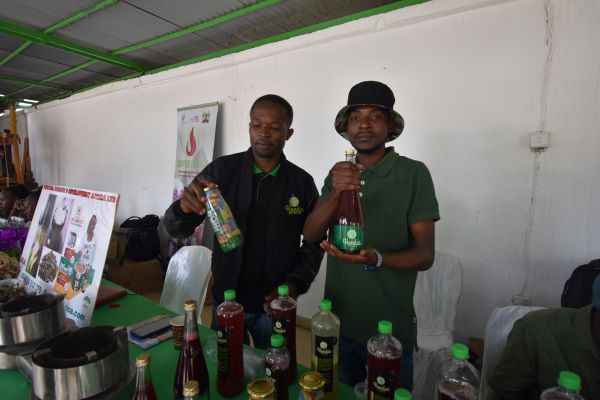By Zablon Oyugi
For many years the most popular way khat users have been relishing the natural stimulant is through chewing the crop’s leaves and tender twigs to squeeze and enjoy its astringent and slightly sweet juice.
As a result, the chewing has made most of them to appear untidy, as their mouths remain consistently filled with a tightly packed mass of chewed substance, including chewing gum and peanuts, to enhance its flavor and compactness.
In addition, the swelling of the mouth can be hurtful and it is also unwelcome given its oddness in some areas such as in an office set up or other formal places and gatherings.
However, this is slowly becoming a thing of the past following various efforts to better khat (popularly known as miraa locally) marketing through improved regulations and policies and now, through value addition.
Brian James is a young man and an entrepreneur from Nairobi’s Langata area who is into khat juice production, a value addition venture he started in 2019 to not only eliminate the stigma by the public about khat lovers being untidy and not ‘cool’ but also provide a product whose use is not restricted to certain areas.
“Before, I use to sell miraa leaves and twigs to the locals customers but I realised that there is a growing segment of the stimulant lovers who do not like chewing but would like it in a form they can take anywhere with them and use without feeling ashamed,” said Brian.
This birthed Handas Juice, a venture he has been running for four years now using hydraulic press machine to extract the khat juice by cold press (without the use of heat and chemicals), distilled and parturition.

The extract which is a compounds of several principal active components such as cathinone and cathine. Others include lkaloids, terpenoids, flavonoids, sterols, glycosides, tannins, amino acids, vitamins and minerals
According to James Lito, Handas Juice Manager, the extract is then flavoured by adding other rich ingredients such as hibiscus, strawberry, passion, pinacolad and apple extracts to also add colour.
“We also have the Sparkling Jaba Juice which is carbonated and it is the first one of its kind in the country based on our market research,” said Lito.
Market
Their products are packed in various bottles branded Handas Jaba Juice and then sold to customers in various wines and spirit joints in Nairobi, Mombasa and Eldoret among others.
They are also exporting their products to Ethiopia’s Addis Ababa and Zanzibar Island of Tanzania. “We have been able to improve bit by bit from our first product by looking at customer preferences and their feedback,” said Aluda Misoga, the enterprise’s branch manager at Roisambu location in Nairobi.
“Our products can also be bought online directly through our website or orders sent to our various social media platforms,” added Misoga.
Challenges
According to Lito, one of the major challenges they are facing is the delicate nature of khat which makes it produce sometimes strong and at times weak flavour hence they have to spend much time sourcing for the quality raw materials that has to be transported for processing in time.
“Regulation issues are also still a problem that has made us lack standardization for our products since there still no regulations for khat value addition in the country,” said Lito adding that this has affected their products’ access to high end markets such as supper markets.
In 2021, the Ministry of Agriculture developed Regulatory Impact Statement for the proposed Crops (Miraa) Regulations 2021 for development, promotion and regulation of miraa value chains for the benefit of farmers and stakeholders in the industry.
In June last year, a report by the National Assembly Agriculture Committee was approved for tabling in the house for further discussions giving hope for the sector players.








